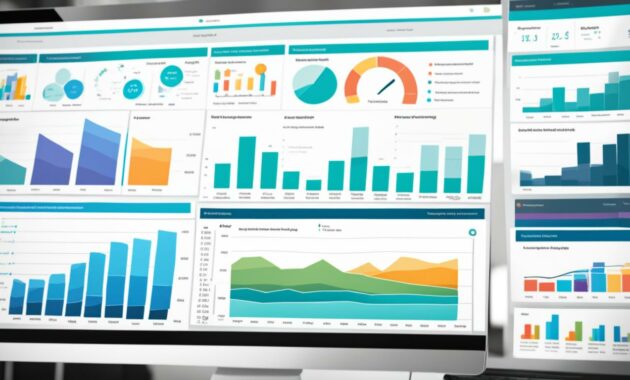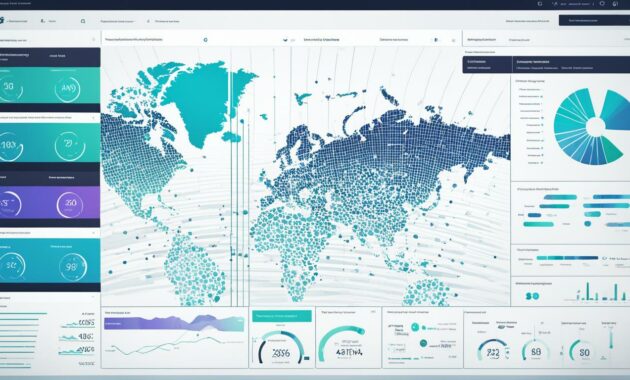Welcome to the world of Business Intelligence Systems. These systems are key to unlocking growth and success for your business. In today’s data-driven world, you need the right tools to make smart decisions.
Business Intelligence Systems help you make informed choices. They let you see hidden patterns, trends, and understand your business better. This knowledge leads to strategic and impactful actions.
Imagine having real-time data at your fingertips. Business Intelligence Systems let you visualize information and create actionable reports easily. They are great for both small startups and large enterprises, turning raw data into valuable insights.
Next, we’ll explore what Business Intelligence Systems are, their benefits, and how to implement them. We’ll also cover key features, challenges, and industry trends. Get ready to enhance your decision-making with Business Intelligence Systems.
What are Business Intelligence Systems?
Business Intelligence Systems help organizations collect, analyze, and display data. They are vital for making informed decisions and keeping a competitive edge. These systems reveal important data insights to help businesses grow.
These systems gather data from many places, like internal systems and social media. This data is then prepared for analysis. Various analytics methods are used to understand the data better.
Visual tools, such as charts and dashboards, make data easy to understand. They help users see trends, patterns, and unusual data points. This helps decision-makers form strategic plans.
Users can also explore data in detail with Business Intelligence Systems. They can look into specific areas or analyze data on the spot. This helps find new chances and risks in the data.
Using these systems offers many benefits. Companies can get to know their customers better, improve operations, and spot market trends. Making decisions based on data can have a real positive effect on profits.
Benefits of Business Intelligence Systems
Business Intelligence Systems have many advantages for your company. They use data and analytics to give important insights. These insights help with better decision-making, leading to more efficiency, a competitive edge, and growth.
They turn raw data into useful information. This is done by merging data from different areas like sales and finance into one clear picture. This allows you to make choices based on current and precise data.

These systems offer interactive dashboards and reports. They show your data in visual formats. This makes it easier to understand how your business is doing, see trends, and find areas to improve.
They improve how you make decisions. With the right information at the right time, your choices support your business aims. You can quickly react to market shifts, fine-tune operations, and use your resources wisely. All of this leads to growth.
Also, they encourage everyone in your company to make decisions based on data. People at all levels can understand and use the data. This supports teamwork across different departments, striving towards shared goals. It makes your business more aligned and quick in decision-making, which improves results.
In conclusion, Business Intelligence Systems provide vital tools and insights for informed decision-making. By using these systems, you stay ahead in the marketplace, boost efficiency, and open up new chances for success. Take advantage of Business Intelligence Systems to bring out the best in your business strategies.
Implementing Business Intelligence Systems
Adding Business Intelligence Systems to your organization is a smart move. It can reveal important insights and spur growth. The key steps include effective setup and use of these systems.
1. Define Your Objectives and Requirements
Start by detailing your business goals and what you need from a Business Intelligence System. Think about the data you want to collect and analyze. Also, consider what metrics are important to your company.
2. Conduct a Data Assessment
It’s vital to thoroughly examine your current data. This makes sure you can smoothly blend it into the Business Intelligence System. Spot any missing or mismatched data that need fixing.
3. Select the Right Software
Pick a system that meets your organization’s needs. Look for features like scalability, user-friendliness, and data visualization. Review various software options to find the best match for your goals.
4. Integrate Data Sources
Merge your data sources with the Business Intelligence System. This might mean moving data from different places into one format. This unified approach gives you a complete overview of your information.
5. Cleanse and Validate Data
Focus on data quality by cleaning and checking your data. Get rid of any errors to ensure your analysis is correct. This step boosts the trustworthiness of your findings.
6. Provide User Training
Make sure your team knows how to use the Business Intelligence System well. Offer training on the software, how to analyze data, and make reports. This prepares them to make the most out of the system.
7. Establish Governance and Security Measures
Set up rules and security to keep your data safe and follow laws. Create strict access rules, protect data privacy, and back up data regularly. This helps protect your information and keeps it accurate.
8. Monitor and Refine
Always check how your Business Intelligence System is doing. Get feedback to make it better and tweak your approach. Keep the system updated to match your changing business needs.
By taking these steps, you can effectively use Business Intelligence Systems. They help you make informed choices, grow, and stay ahead in your field.
Key Features to Look for in Business Intelligence Systems
When choosing a Business Intelligence System, it’s key to look at features that fit your needs. These features greatly help with analyzing data and making decisions. Here are some main features to consider:
User-friendly Interface
A Business Intelligence System needs an easy-to-use interface. It should allow anyone to navigate and find data easily, no matter their tech skill level. This ensures your team uses the system effectively without needing lots of training.
Data Visualization Capabilities
Seeing data in charts and graphs is important for understanding it better. Choose a system with strong data visualization like interactive dashboards. This helps to see trends, spot unusual data, and share insights clearly.

Scalability
Your business will grow, and so will your data needs. It’s important to pick a system that grows with you. A scalable system can handle more data without losing quality or speed, supporting your business as it gets bigger.
Data Integration
A good Business Intelligence System must work with different data sources. Look for one that brings together data from everywhere into one view. This makes sure you’re always working with the latest, most accurate data.
Choosing the right Business Intelligence System means considering these key features. Go for a system that is easy for everyone to use, can show data in clear visual forms, grows with your business, and can integrate data from various sources. This will help your team find valuable insights and help your business grow.
Overcoming Challenges in Business Intelligence Systems Adoption
Implementing Business Intelligence Systems can change organizations for the better. They offer valuable insights and strategic advantages. But, understanding and overcoming their challenges is crucial for successful adoption.
Lack of Data Quality and Integration
Organizations often struggle with data quality and integration. Incomplete or inconsistent data affects the accuracy of Business Intelligence Systems. To fix this, it’s essential to have strong data governance. This ensures data is standardized across all systems.
Resistance to Change and Lack of User Adoption
Resistance to change is a big hurdle. Employees might not want new systems. To overcome this, it’s vital to show the benefits of Business Intelligence Systems. Including employees in decisions and providing training can also boost adoption.
Complexity and Scalability
Business Intelligence Systems can be complex and need technical expertise. As businesses grow, keeping the systems up-to-date becomes a challenge. Choosing a scalable system is essential. Regular evaluations help keep the system effective as your business evolves.
Data Security and Privacy
Data security and privacy are major concerns. It’s critical to protect data from unauthorized access. Implementing strong security measures is a must. Following industry regulations ensures data privacy and confidentiality.
Cost and Return on Investment (ROI)
Business Intelligence Systems come with costs. Organizations need to think about the investment and ongoing expenses. Calculating the ROI is crucial to justify the investment. This helps assess the long-term benefits like improved decision-making and business growth.
By tackling these challenges, organizations can smoothly adopt Business Intelligence Systems. Overcoming these obstacles allows businesses to gain insights, make better decisions, and grow.
Industry Trends in Business Intelligence Systems
The Business Intelligence Systems world is always changing. New technologies and market changes drive this. It’s key for businesses to stay updated to grow.
Artificial Intelligence and Machine Learning
AI and ML are big trends now. These let businesses get insights from big data fast.
With AI and ML, companies can analyze data, spot trends, and predict the future. This makes decisions quick, boosting efficiency and edge over competitors.
Advanced Data Visualization
Data visualization is essential now more than ever. New trends make presenting complex data easy and interesting.
Using interactive dashboards, infographics, and charts makes data simple to understand. Seeing data in real-time lets businesses spot trends and decide faster.
Embedded Analytics
Analytics is now getting built into business apps directly. This is called embedded analytics. It makes data tools easy to use in daily work.
This trend stops the need to switch software and boosts productivity. Instant insights help make fast, informed choices, spreading a culture of smart decisions.
Cloud-Based Business Intelligence
The move to cloud-based Business Intelligence Systems is growing. The cloud makes these systems scalable, flexible, and easy to access without big costs.
Cloud BI lets businesses expand easily as data needs grow. It also improves teamwork and data sharing, making analytics and decisions faster, even when teams are far apart.
Enhanced Data Governance and Security
With data’s value increasing and regulations getting tougher, data governance and security are key. Business Intelligence trends focus on better data management and strong security measures.
Good data governance ensures data accuracy and compliance. Strong security, like encryption and multi-factor authentication, keeps sensitive data safe and lowers breach risks.
The Future of Business Intelligence Systems
The future of Business Intelligence Systems is bright, with progress in natural language processing, augmented analytics, and predictive modeling. Businesses keeping up with these trends will thrive in the future economy.
Conclusion
In today’s fierce business world, using Business Intelligence Systems is key for growth. These systems give companies insights for making smart choices. By using data effectively, businesses can find new opportunities, solve problems, and reach higher success levels.
We covered different parts of Business Intelligence Systems in this article. We looked at what they are and their workings, their benefits, and what to consider when choosing one. We also looked at potential challenges and the latest trends in this area.
Looking ahead, it’s important to see how essential Business Intelligence Systems are for growth. Adding these systems to your operations can give you an advantage, help make informed decisions, and reveal important insights. Strategic decision-making drives success, and the right system unlocks your organization’s potential.



